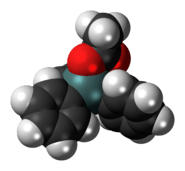Fentin acetate
 | |
 | |
| Names | |
|---|---|
| IUPAC name
(acetoxy)(triphenyl)stannane | |
| Other names
Phentin acetate; Triphenyltin acetate; Triphenylstannyl acetate; Acetic acid tri(phenyl)stannyl ester | |
| Identifiers | |
| 900-95-8 76-87-9 (fentin hydroxide) | |
| 3D model (Jmol) | Interactive image |
| ChEBI | CHEBI:81918 |
| ChEMBL | ChEMBL474376 |
| ChemSpider | 8085060 |
| ECHA InfoCard | 100.011.804 |
| KEGG | C18728 |
| PubChem | 16682804 |
| |
| |
| Properties | |
| C20H18O2Sn | |
| Molar mass | 409.07 g/mol |
| Hazards | |
| Main hazards | Very toxic (T+) Dangerous for the environment (N) |
| R-phrases | R24/25 R26 R37/38 R40 R41 R48/23 R50/53 R63 |
| S-phrases | S26 S28 S36/37/39 S45 S60 S61 |
| Lethal dose or concentration (LD, LC): | |
| LD50 (median dose) |
21 mg/kg (guinea pig, oral) 30 mg/kg (rabbit, oral) 81 mg/kg (mouse, oral) 125 mg/kg (rat, oral)[2] |
| Except where otherwise noted, data are given for materials in their standard state (at 25 °C [77 °F], 100 kPa). | |
| | |
| Infobox references | |
Fentin acetate is an organotin compound with the formula (C6H5)3SnO2CCH3. It is a colourless solid that is used as a fungicide.[3]
External links
- Fentin acetate in the Pesticide Properties DataBase (PPDB)
References
- ↑ Fentin acetate at Sigma-Aldrich
- ↑ "Tin (organic compounds, as Sn)". Immediately Dangerous to Life and Health. National Institute for Occupational Safety and Health (NIOSH).
- ↑ G. G. Graf "Tin, Tin Alloys, and Tin Compounds" Ullmann's Encyclopedia of Industrial Chemistry, 2005, Wiley-VCH. doi:10.1002/14356007.a27_049
This article is issued from Wikipedia - version of the 8/24/2016. The text is available under the Creative Commons Attribution/Share Alike but additional terms may apply for the media files.